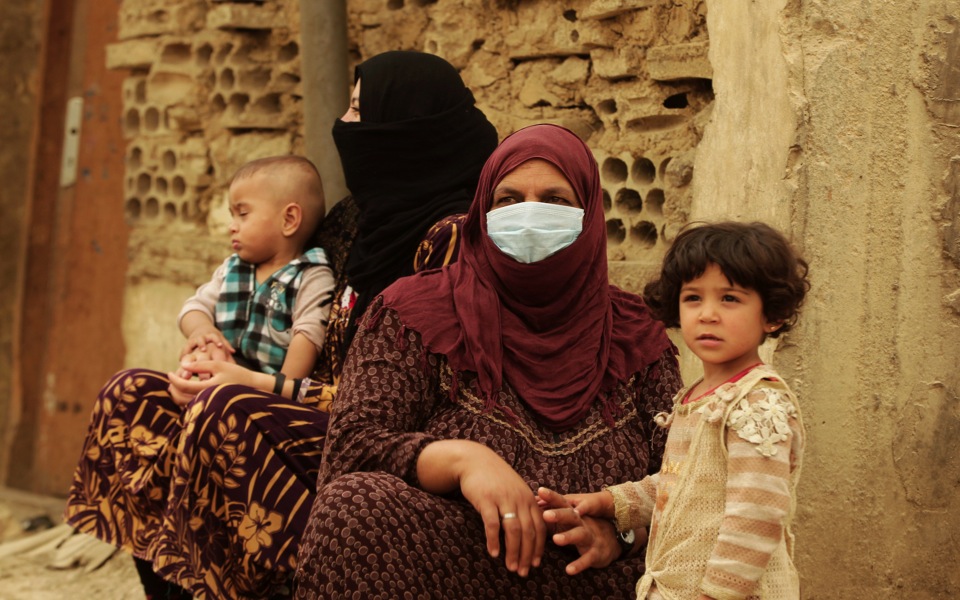Syrians seek legal route to Europe without perilous boat trips

Omar Badran was lucky to make it to Sweden alive after the smugglers’ boat he took from Libya to Europe sank, leading to the deaths of dozens of fellow migrants.
Now, the Syrian father of three hopes his family will be spared such dangers and be allowed to travel directly from Turkey to join him in his new home.
With legal routes to Europe almost impossible for most of those fleeing Syria’s civil war, Sweden’s decision in 2013 to grant permanent residency to Syrian refugees offers one of the few routes to Europe without braving peril at sea.
As automatic permanent residents, Syrian refugees in Sweden are swiftly allowed to invite close family to join them, a right that in other European countries can take years and may require proof that the first refugee can support the others.
In Ankara’s leafy diplomatic district, only the Swedish Embassy has lines of mainly Syrian migrants waiting patiently outside its gates each morning. Most have at least one family member who has already made the dangerous and illegal journey across Europe and is sponsoring their application.
“I had no choice, I couldn’t go legally,” said Badran, 37, who came back to Turkey from Sweden to help ensure that his relatives’ application to join him would be approved.
“Europe should do more to help. Of course Syrians will keep coming illegally. Anything is better than death in Syria,” he said, recounting the horror of watching friends and relatives drown on one of several boats that sank in August 2014.
Europe is struggling to deal with the humanitarian and political fallout from hundreds of thousands of migrants, many fleeing conflict in the Middle East, arriving to seek asylum.
The image of the tiny body of a Syrian toddler found washed up on a Turkish beach last week has piled further public pressure on European leaders to open their doors and spare refugees from the hands of people traffickers.
The crisis has divided EU countries, with some, like Germany and Sweden, offering a warmer welcome while others try to discourage migrants from coming.
The Danish government this week published advertisements in Middle Eastern newspapers warning potential migrants that financial assistance for refugees in Denmark was being slashed, and that family reunification would be difficult.
Sweden, which former Prime Minister Fredrik Reinfeldt once called a “humanitarian superpower,” has welcomed refugees for decades and receives more asylum seekers per capita than any other EU nation, with the numbers rising sharply.
Although most Swedes are still proud of that reputation, there has been some backlash at home.
Fredrik Beijer, general counsel at the Swedish Migration Agency, said migrants were attracted to Sweden because it “has a reputation as a country that deals with refugees in a good way. Our system works.”
Nevertheless the sheer numbers mean that there is now a backlog and the process is slowing down, he said.
European Commission head Jean-Claude Juncker on Wednesday proposed a new system of quotas to distribute asylum seekers who reach Europe among member-states.
But some countries say that a warm welcome for those reaching the continent illegally just encourages others to make the dangerous journey.
“Europe needs to take in more people, and to do it in a more dignified and planned way,” said Jean-Christophe Pegon, Turkey head of the European Commission
Directorate-General for Humanitarian Aid and Civil Protection (ECHO).
One solution would be to let more refugees apply for asylum remotely in countries like Turkey, which is currently sheltering 2 million Syrians. “A better asylum system would enhance their chances,” Pegon said. “But it’s still based on nations being willing to take them in. If countries are not opening their gates, improving procedure won’t help.”
Tens of thousands of Syrians have descended on Turkey’s Aegean coast this summer to catch a boat to tantalizingly nearby Greek islands, in some cases just 2 miles (4 km) away.
They represent a small proportion of those sheltering in Turkey. But as the government in Ankara warns it is reaching capacity and Turkey grapples with its own domestic concerns, the temptation of the relative wealth of Europe lures many who can afford to pay smugglers thousands of dollars.
“Refugees go where they feel the best possible future for their family is going to be,” said Rae Mcgrath, North Syria and Turkey director for the charity Mercy Corps.
For now, remote asylum requests are almost unheard of, leaving little option for refugees in Turkey but to try to reach Europe illegally, shelter in camps on the Syrian border or eke out a living in Turkey’s major cities, where families camp in derelict buildings or beg in the streets.
Swedish Ambassador to Turkey Lars Wahlund told Reuters directly offering asylum at embassies could create a “tsunami” of applications.
“That’s not possible without international agreements with many countries. For now the only feasible way I see to lessen the burden would be to increase UN quotas,” Wahlund said.
Many Western countries have already agreed to take people directly from refugee camps in Turkey, Lebanon and Jordan on Syria’s borders. Britain said this week it will take 20,000 over the next five years directly from the region, rather than accept a share of those who reach other parts of the European Union. But such numbers are marginal against the 4 million refugees in countries directly neighboring Syria, and around 7.5 million internally displaced within Syria itself.
Selin Unal, spokeswoman for the United Nation’s Refugee agency (UNHCR) in Turkey said that alongside quotas, other mechanisms including humanitarian admission programs and scholarships for children should be rolled out.
“The only people benefiting now are the smugglers,” she said.
Menal, 42, used to run a restaurant in Damascus before paying $10,000 to travel illegally to Sweden. He is now hoping to bring his wife and disabled son back, although he acknowledges the challenge European nations face.
“Of course if they make it easier, then everyone in Syria would want to come,” he said. “It’s a big problem for Europe.”
[Reuters]





